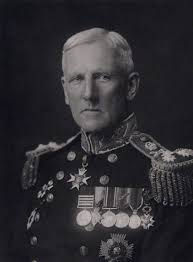The First 'C' - Head of MI6
- Shaun Lewis
- Feb 11, 2019
- 3 min read
The current and all past heads of Britain's Secret Intelligence Service (SIS) are and have been known as 'C', for "Chief", but the first head of SIS was known as 'C' for a different reason. Commander Mansfield Cumming used to sign documents in green ink with the letter C.
Cumming had been retired from the Royal Navy on medical grounds due to his chronic sea sickness. As a retired officer, he went on to work on the design and operations of boom defences, based on the River Hamble. However, in August 1909, he was approached by the head of naval intelligence, Admiral Bethell and asked to form a new Secret Service Bureau (SSB) jointly with an army officer, Captain Vernon Kell. Up until then there had been no permanent intelligence service in Britain, but various German spy scare stories in the press and books of fiction by famous authors had caused a public outcry and the government decided to act.
Even so, the War Office (army) saw little need for the new SSB, preferring to rely on its own intelligence operation, although later it had plans to take over the SSB for its own purposes. The War Office's only requirement of the SSB was for early notice of any likely outbreak of war with Germany. The Admiralty, however, thought the SSB might have some use in placing and running agents in Germany to learn more of German naval developments. As Kell already had experience of intelligence operations, he and Cumming agreed amongst themselves that he would run counter-intelligence operations in concert with Special Branch, the Home Section, and Cumming would focus on overseas espionage, the Foreign Section. Cumming's section became known as the Secret Service.
One of Cumming's first actions was to take up offices separate to those of Kell on the grounds that it was embarrassing continually to meet fellow officers outside the SSB offices near the Army and Navy store in Victoria. He rented an office at his own expense in Vauxhall Bridge Road, opposite the site of today's SIS headquarters. He took German lessons and began to build up a network of agents. He referred to agents as scallywags, as many were, motivated primarily by cash. Whilst he was to receive much support from the Admiralty in recruiting and placing agents, the Admiralty continued to run its own intelligence operations. It frustrated him that not only was there duplication of his own operations, but the security of his organisation was frequently undermined by naval and marine officers knowing his identity and role.
Cumming was an enthusiast for gadgets and fast motor cars. He also learned to fly. As well as being Ian Fleming's inspiration for 'M', he may have inspired his ideas for 'Q'. Unfortunately, whilst driving his Rolls-Royce in France in late 1914 with his son, Cumming suffered an accident. His leg was trapped under the car, but he heard his son call. Cumming was later to say that he amputated a part of his leg with a penknife in order to attend his son, who died anyway. In any event, Cumming was fitted with an artificial extension to his leg and delighted in shocking potential recruits by stabbing himself in the leg during the interview.
In time, Cumming was able to place agents beyond Germany, including Ireland, the Netherlands, Russia, the Mediterranean and Egypt. His staff included both serving naval and army officers, as well as a number of famous authors, including John Buchan, Somerset Maugham and Compton Mackenzie. Perhaps his greatest success was the running of a behind-the-lines intelligence network in Belgium and northern France, La Dame Blanche, providing timely and accurate information on German rail movements. He was less successful in his joint attempt with the head of naval intelligence to bribe the Turks to withdraw from the war. His agents in the negotiations were not to know of the government's secret promise to hand Constantinople to the Russians. He, also, only achieved limited success in running an intelligence network in post-revolutionary Russia. He placed too much reliance on a "scallywag", one Sidney Reilly. However, he did gain valuable intelligence from Paul Dukes, the only SIS officer to be knighted whilst still working as a field agent.
Cumming's achievements were rewarded with his promotion to Captain, a CB and a knighthood. He died in office in 1923 and was succeeded in his post by the then head of naval intelligence.







Comments